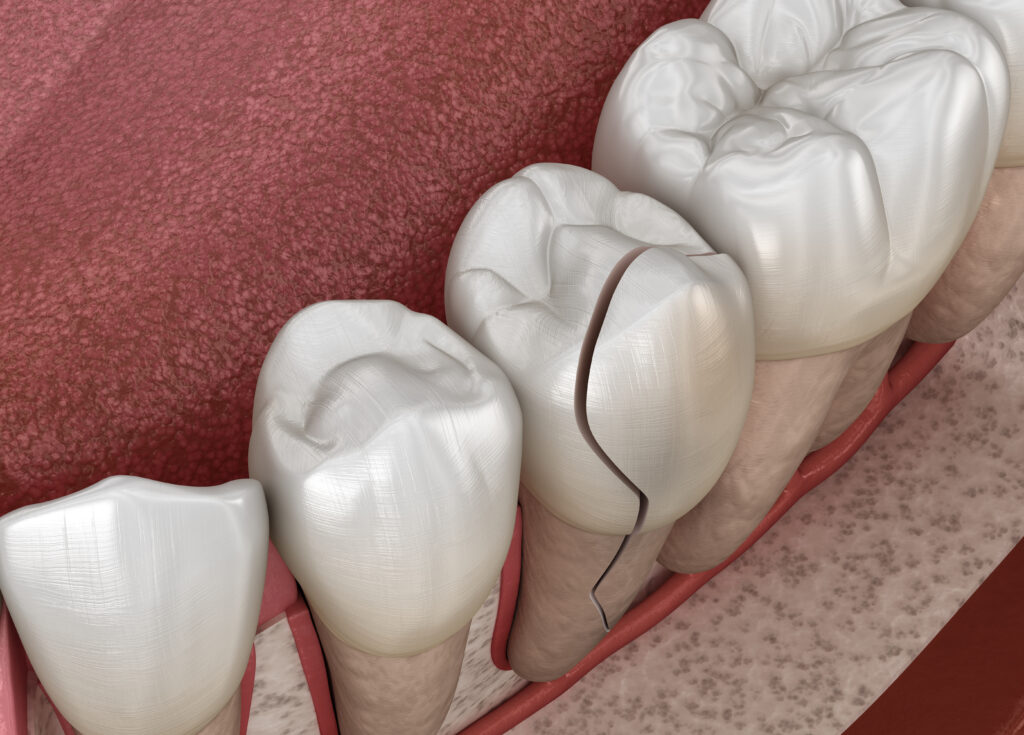(801) 212-9061
7555 Center View Ct Suite 104 West Jordan, UT 84084
Broken or Cracked Tooth in West Jordan

Cracked teeth present a common yet complex dental problem, often resulting from factors like biting on hard objects, grinding, or general wear and tear. These cracks can vary in size, location, and severity, affecting not just the appearance but also the health of your teeth.
If you may have a cracked tooth, contact us today to schedule an appointment (801) 212-9061.
Diagnosis and Identification
- Symptoms: Patients with cracked teeth may experience pain when chewing, temperature sensitivities, or discomfort that comes and goes. However, not all cracks are immediately noticeable or painful.
- Professional Evaluation: Our dentists use various methods to diagnose cracked teeth, including visual exam, dental dye, and X-rays. Sometimes, a special dental instrument, called an explorer, is used to feel for cracks.
Types of Cracks and Corresponding Treatments
- Craze Lines: These are superficial cracks that affect only the outer enamel. Generally, no treatment is needed unless for cosmetic reasons.
- Fractured Cusp: When a piece of the tooth’s chewing surface breaks off it is called a fractured cusp. Often, this type of crack does not affect the pulp of the tooth and is treated with a filling or crown.
- Cracked Tooth: This type of crack extends from the chewing surface down towards the root. A root canal may be necessary if the crack extends into the pulp. The tooth is then restored with a crown to prevent the crack from getting worse.
- Split Tooth: This is usually the result of an untreated cracked tooth. A split tooth is often not savable in its entirety, but part of it can be preserved with endodontic treatment and a crown.
- Vertical Root Fracture: These cracks begin in the root and extend towards the chewing surface. Treatment often involves endodontic surgery if a portion of the tooth can be saved. Otherwise, the tooth may need to be removed.
Treatment Options
- Dental Bonding: For minor cracks, composite resin is used to fill and restore the tooth’s appearance.
- Root Canal Therapy: If the crack has extended into the pulp, a root canal is performed to remove the damaged pulp and seal the tooth.
- Crowns: A dental crown is often used to cover and protect a cracked tooth, especially after a root canal.
- Extraction: In severe cases where the tooth cannot be saved, extraction is the last resort. This is followed by tooth replacement options like implants or bridges.

Common Misconceptions about Cracked Teeth Treatment
Misconception: A Cracked Tooth Always Results in Tooth Loss
Fact: Many cracked teeth can be saved with appropriate treatment, such as bonding, crowns, or root canals.
Misconception: Treatment for a Cracked Tooth is Always Painful
Fact: Modern dental techniques and anesthetics make the treatment of cracked teeth manageable and often pain-free.
Misconception: Minor Cracks Don’t Require Dental Attention
Fact: Even minor cracks should be evaluated by a dentist to prevent the potential for any further damage and more serious problems in the future.
Effective treatment of cracked teeth is essential for maintaining oral health and preventing further complications. Understanding the types of cracks, their appropriate treatments, and the importance of timely intervention is key to preserving your natural teeth.
If you suspect a cracked tooth or are experiencing related pain call our office at (801) 212-9061.
Frequently Asked Questions
Common signs of a cracked tooth include pain when chewing, sensitivity to hot or cold, discomfort that comes and goes, and sometimes visible lines on the tooth. Pain may be intermittent and can vary in intensity. It’s important to consult a dentist if you experience these symptoms, as early detection and treatment can prevent further damage.
Teeth can crack due to various reasons such as biting down on something hard, accidents or trauma, grinding or clenching teeth, uneven chewing pressure, or wear and tear from aging. Some dental procedures, like large fillings, can also weaken teeth, making them more susceptible to cracking.
Diagnosing a cracked tooth involves a dental exam, where our dentist may use a magnifying lens to inspect the teeth closely. Dental X-rays might be taken, but they don’t always show the crack. Sometimes a special dye or a dental explorer tool is used to find or feel the crack.
Treatment for a cracked tooth depends on the size, location, and severity of the crack. Options include bonding, dental crowns, root canal treatment, or in severe cases, extraction. Our dentist will recommend the most appropriate treatment to save the tooth and prevent further damage.
Unlike bones, a cracked tooth will not heal on its own. Even a small crack can get worse over time if not treated, potentially leading to infection or more severe damage. It’s important to seek dental advice even for minor cracks.
Yes, it’s important to treat a cracked tooth, even if it’s not causing pain. Untreated cracks can lead to more serious dental issues, including tooth decay and infection.
Whether a root canal is necessary depends on whether the crack extends into the pulp of the tooth. If the pulp is affected, a root canal treatment may be needed to remove the damaged pulp and restore the tooth’s integrity.
Preventative steps include avoiding chewing on hard objects (like ice or hard candy), not using teeth to open things, wearing a mouthguard during sports, and using a night guard if you grind your teeth. Regular dental check-ups also help in early detection and prevention of further cracking.
The success of cracked teeth treatment largely depends on the crack’s location and severity. Early treatment usually has a high success rate, while more severe cases might require complex procedures.
If you suspect you have a cracked tooth, it’s important to schedule an appointment with our dentist as soon as possible. Avoid chewing on the side of the suspected crack, and stick to soft foods to prevent further damage until your dental visit.
BOOKING HOURS
M 8AM–5PM | Tu 8AM–5PM | Wed 7AM–6PM | Th 8AM–5PM | Fr 8AM–5PM
We are OPEN for ALL dental care procedures and emergency needs. Protecting the health and safety of our patients, families, and team members remains our number one priority.
Free $50 Gift Card*
$50 Gift Card when you complete an appointment with us!
*Redeemable after completed paid treatment. Must be a new patient to our organization and must not have been seen in ANY OF OUR LOCATIONS. The patient will receive a gift card via email or SMS after completion of their appt.
Free Exam & X-ray^
For New Patients without insurance we offer Free Exam and X-rays!
^For New Patients that do not have dental insurance. New patients must be 18 or older to receive free exam and x-rays. Discounts cannot be combined with other offers or dental discount plans. Additional fees may be included in individual cases.
$99 Hygiene Visit^^
For New Patients without insurance we offer Free Exam and X-rays!
^^For new patients without dental insurance. Includes Exam, X-Ray and Routine Cleaning. A Periodontal Cleaning requires additional fees, and rescheduled for further treatment. Cannot be combined with other offers or dental discount plans.

